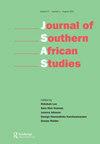Religion and Political Parties in South Africa: A Framework and Systematic Review
IF 0.7
4区 社会学
Q2 AREA STUDIES
引用次数: 0
Abstract
The role of religion in political parties has been under-researched in South Africa. This study develops a novel theoretical framework for analysing political parties’ use of religion, which distinguishes between parties’ orientation towards religion (that is, religious or secular; inclusive or exclusive) across three domains: state law, the institutional rules of the party, and the informal norms that govern the actions of the party and behaviour of the party members. It uses systematic review methods to apply this framework to the scholarship on religion and political parties in South Africa. The framework and review challenge the narrative that the religious rhetoric used by the African National Congress (ANC) in the last decade has been a break with the party’s secular past. On the contrary, the ANC has historically used religious rhetoric while supporting secular legislation and party rules concurrently. The review draws attention to how the National Party (NP) exercised religion during apartheid; although it worked closely with the Dutch Reformed Church, the party pursued a religious nationalism that progressively usurped the authority to determine the boundaries of authentic religious practices. Despite the religiosity of the electorate, few parties in post-apartheid South Africa advocate religious legislation, and these parties perform poorly in elections. These findings illustrate the importance of a theoretical framework that distinguishes between political parties’ diverse uses of religion and secularism rather than their ‘essential’ orientation towards religion.南非的宗教与政党:框架与系统回顾
在南非,宗教在政党中的作用研究不足。这项研究开发了一个新的理论框架来分析政党对宗教的使用,该框架区分了政党在三个领域对宗教的取向(即宗教或世俗;包容性或排他性):国家法律、政党的制度规则以及管理政党行为和党员行为的非正式规范。它使用系统的审查方法将这一框架应用于南非宗教和政党的学术研究。该框架和审查挑战了非洲人国民大会(ANC)在过去十年中使用的宗教言论与该党的世俗历史决裂的说法。相反,非国大在历史上一直使用宗教言论,同时支持世俗立法和政党规则。审查提请注意民族党在种族隔离期间是如何行使宗教的;尽管该党与荷兰归正教会密切合作,但它奉行的宗教民族主义逐渐篡夺了确定真正宗教实践界限的权力。尽管选民信奉宗教,但在种族隔离后的南非,很少有政党主张宗教立法,而且这些政党在选举中表现不佳。这些发现说明了一个理论框架的重要性,该框架区分了政党对宗教和世俗主义的不同使用,而不是他们对宗教的“本质”取向。
本文章由计算机程序翻译,如有差异,请以英文原文为准。
求助全文
约1分钟内获得全文
求助全文
来源期刊

Journal of Southern African Studies
AREA STUDIES-
CiteScore
1.40
自引率
0.00%
发文量
73
期刊介绍:
The Journal of Southern African Studies is an international publication for work of high academic quality on issues of interest and concern in the region of Southern Africa. It aims at generating fresh scholarly enquiry and rigorous exposition in the many different disciplines of the social sciences and humanities, and periodically organises and supports conferences to this end, sometimes in the region. It seeks to encourage inter-disciplinary analysis, strong comparative perspectives and research that reflects new theoretical or methodological approaches. An active advisory board and an editor based in the region demonstrate our close ties with scholars there and our commitment to promoting research in the region.
 求助内容:
求助内容: 应助结果提醒方式:
应助结果提醒方式:


